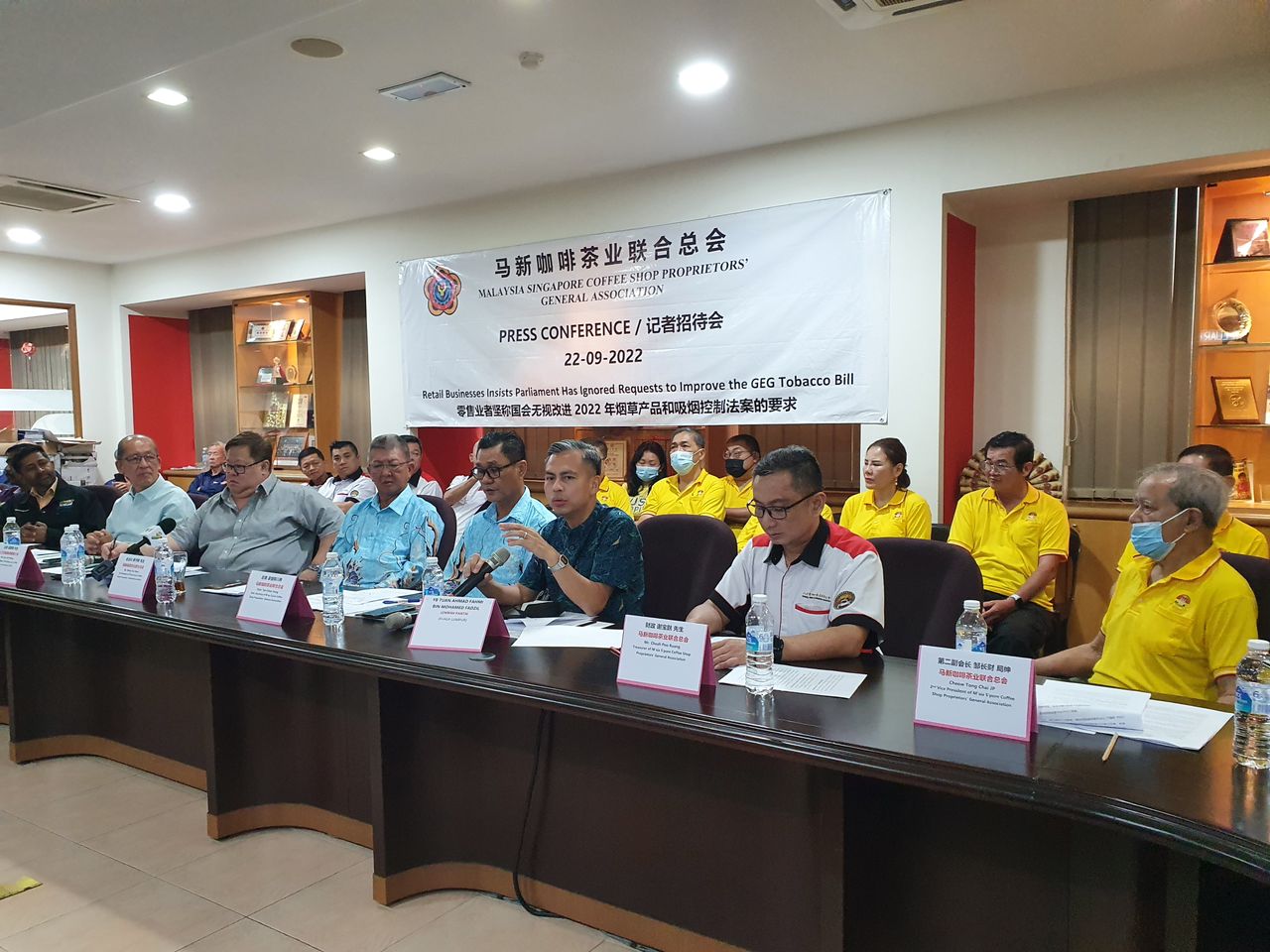KUALA LUMPUR, Sept 23 – PKR information chief Fahmi Fadzil yesterday met with retail businesses to hear their concerns on the government’s proposed tobacco generational end game (GEG).
The Malaysian Singapore Coffeeshop Proprietors’ General Association (MSCSPGA), the Malaysian Indian Restaurant Owners Association (Primas), the Malaysian Muslim Restaurant Owners Association (Presma), and the Federation of Sundry Groups Merchants Associations Malaysia (FSGMAM), in a joint statement, called for a comprehensive consultation, briefing, and impact study with retailers before Parliament passes the Control of Tobacco Product and Smoking Bill 2022 that seeks to prohibit tobacco and vape products for anyone born from 2007.
“Until now, we have not been consulted on the GEG bill nor received any briefing on the implementation of the proposed measures that was reported in the media,” said MSCSPGA president Wong Teu Hoon.
Revisions to the tobacco bill are currently being discussed by a newly formed parliamentary special select committee (PSSC) chaired by Health Minister Khairy Jamaluddin. The PSSC is expected to finalise revisions next week before the upcoming Dewan Rakyat meeting starting from October 3.
The health, science and innovation PSSC chaired by Bandar Kuching MP Dr Kelvin Yii, which had done extensive stakeholder engagements on the tobacco bill from April, did not consult retailers, according to its report tabled last July 28, although the committee heard feedback from tobacco companies.
However, Galen Centre for Health and Social Policy chief executive Azrul Mohd Khalib, who attended two consultation meetings by the health PSSC on the tobacco bill, pointed out that MSCSPGA’s Wong was invited twice to the meetings, but he did not turn up.
“A lot of the discussions on GEG has focused on health, but like what we’ve heard, there is impact on human resources, children and women, and the economy,” Fahmi said at the retailers’ press conference yesterday.
Previously, the PSSC on women and children affairs and social development, chaired by Pengerang MP Azalina Othman Said, expressed concern with the criminalisation of minors for smoking or vaping under the tobacco bill, such as powers of search and seizure in private residences without a warrant, including body searches.
Fahmi, who is also Lembah Pantai MP and Pakatan Harapan (PH) communications director, is not a member of the bipartisan tobacco bill PSSC. Most of the 13-member committee are not part of the leadership of their respective parties.
Retail businesses questioned how prohibitions of tobacco sales to adults aged 18 and older born from 2007 – which are expected to be enforced from 2025 – could be operationalised by retailers as frontliners, since the Ministry of Health (MOH) will not be able to employ enforcers at every retail outlet.
“Retail operators will be the ones expected to conduct the ID checks, which itself will cause certain tensions in-store,” said Primas president J. Suresh.
“As the bill does not allow those born from 2007 to work in shops that sell cigarettes, operating costs for these small businesses will rise and cause many to go out of business.”
Although Khairy expressed confidence at a Wednesday media interview that the Dewan Rakyat would pass the tobacco bill in the upcoming Parliament meeting, he did not specify the mechanism for retail businesses to avoid selling tobacco products to adults born from 2007.
Malaysia’s current tobacco regulations prohibit the sale of cigarettes and other tobacco products to minors aged below 18, which can be easily operationalised by looking at the physical appearance of potential buyers without necessarily asking for their identity card.
The Edge reported last August 3 Bursa filings by Green Packet Berhad and Privasia Technology Berhad that denied a StarBiz report claiming that both companies were attempting to get MOH approval for a new digital tracking system for the GEG and to combat illicit cigarettes.
MSCSPGA, Primas, Presma, and FSGMAM claimed that sales of legal tobacco products in retail shops comprise 30 per cent of total revenue.
“The GEG will impact revenue of retail shops at a time when the country is preparing for an unprecedented global recession.”
FSGMAM president Hong Chee Meng also expressed concern with the penalties proposed for businesses under the Control of Tobacco Product and Smoking Bill, in which retailers convicted of selling cigarettes to the GEG group will be fined a minimum of RM30,000 or face imprisonment of up to three years, or both.
New Zealand’s Smokefree Environments and Regulated Products (Smoked Tobacco) Amendment Bill punishes the sale and delivery of smoked tobacco products to anyone born from 2009 with a fine not exceeding NZ$150,000 (RM399,620) upon conviction. No incarceration is proposed.
The Federation of Private Medical Practitioners’ Associations Malaysia (FPMPAM) recently urged MOH to consider harm reduction approaches to smoked tobacco, such as non-combustion nicotine products like e-cigarettes or vape, and to conduct clinical studies on alternative products before passing the tobacco control bill.
At his recent media interview, Khairy did not elaborate on the tobacco bill PSSC’s proposed revisions to the legislation.
By Malaysian parliamentary convention, all PSSC meetings are classified, unlike Western democracies like the UK and New Zealand that broadcast all their parliamentary select committee proceedings.
It is unclear if the government will publish the revised draft bill for viewing by the general public before formal tabling for debate in Parliament.
Even the health, science and innovation PSSC did not receive the draft tobacco bill before it was tabled in the House, leading the committee to publish its 47-page report a day after Khairy tabled the bill on July 27.
Khairy was forced to pull the tobacco bill from debate at the last Dewan Rakyat meeting, after multiple MPs opposed being made to debate and pass the controversial legislation in less than a week after it was tabled for first reading.








